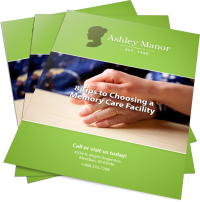For some people, the idea of their loved one moving out of their home and into a memory care center can raise uncertainty, be disheartening and even sad. Whatever you feel, your loved one probably feels times ten. As an advocate for their care and wellness, it’s important that you play an active role in helping them make this transition.
Make a Gradual Transition
Try not to make the move abruptly. If possible, once you have decided on a care facility, plan a visit to the center with your loved one outside the confines of a traditional tour prior to move in. For instance, the two of you can visit for lunch or during a social gathering hour. As your loved one gets relaxed and settled in the environment, you can then begin to talk about them moving into the facility.
Listen to All Concerns
If your loved one presents a concern about the move – hear them out. Everyone wants to be heard and be taken seriously. A diagnosis of dementia or Alzheimer’s does not absolve this desire. Even if their concern is not valid, it means a lot to at least show your loved one that you care and that you are taking the time to listen. Your willingness to engage will make them feel safe and loved during this transition, which is very important.
Bring Home Along
For most people, home isn’t the structure itself. It is the pictures, memories and other accents that make a house a home. Bring along as many of these items as you can. It doesn’t matter if it’s a family photo to hang on the wall or a quilt they have had for years, these elements make their new space feel like home, help them connect to the new place and feel as though it is their own.
Keep up with Routines
If you stopped by your loved one’s home every morning before heading into work, keep it up. Keeping up with routines doesn’t just bring comfort, it also creates a sense of familiarity, which is important for these types of diseases. As their disease progresses, you may feel that your efforts are useless as they may not be as aware of your presence as in the past, but the more familiar the routine, the better they will adapt to the new environment.
Your actions won’t just make the transition easier for your loved one, but it can also help ease many of your concerns. Play an active role to make the transition as painless as possible for all involved.



Leave a Reply